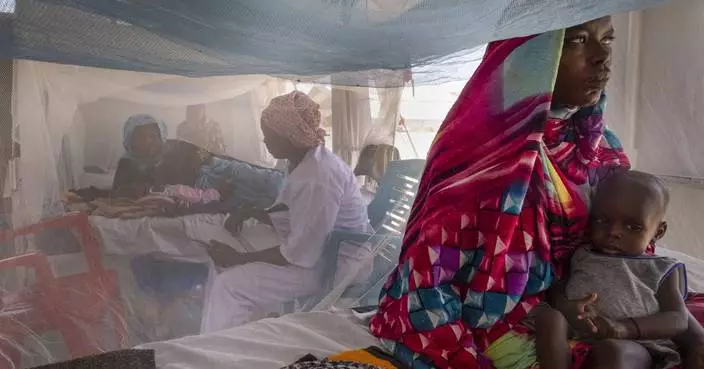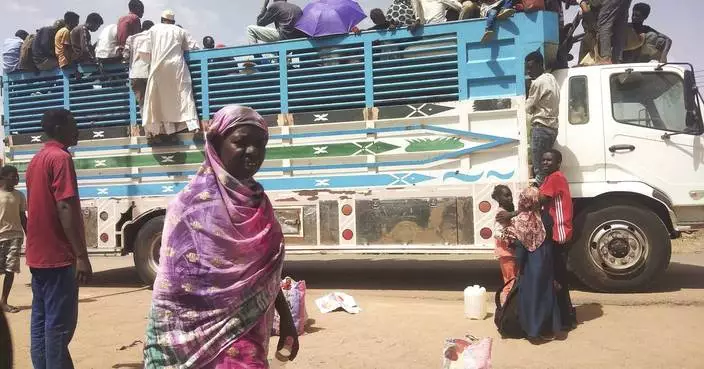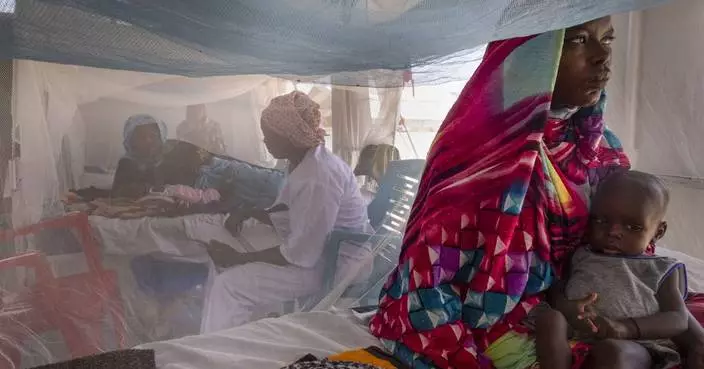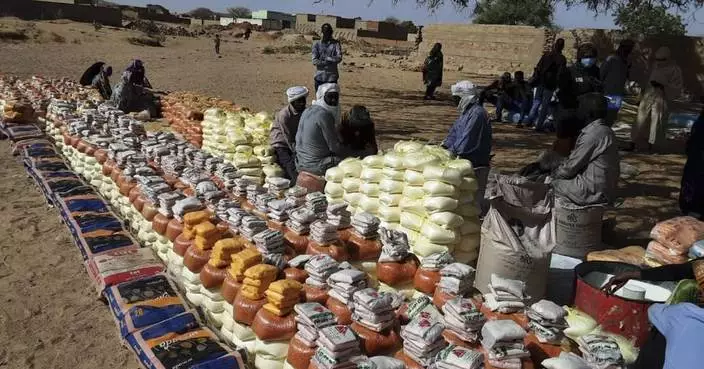Sudanese activists were holding nationwide protests on Tuesday to press the military to hand over power to a civilian authority after the overthrow of President Omar al-Bashir earlier this month.
Railway workers and other protesters gathered in Atbara, the northern transport hub where the uprising began in December, and traveled by train to the capital to join tens of thousands outside the military headquarters in Khartoum, where protesters have kept up a sit-in since April 6.
Al-Bashir, who ruled Sudan for 30 years, was forced from office on April 11 after four months of protests led by the Sudanese Professionals Association, a group of private unions that is demanding a full and immediate transfer of power to a civilian council.
The SPA suspended talks with the military over the weekend after the military council said it was consulting all of Sudan's political forces on a path forward. The protesters accuse the council of failing to make a clean break with al-Bashir's regime and of trying to marginalize the SPA by depicting it as one of many political factions.
The SPA says the head of the military council's political committee and its chief negotiator, Lt. Gen. Omar Zain al-Abdin, was the head of al-Bashir's party within the military and "is trying to bring back the deposed regime."
The protesters also say the military council has yet to recognize the Forces of the Declaration of Freedom and Change — a coalition led by the SPA and including other groups — as their representative. The protesters fear Islamists and other factions close to al-Bashir, who is now jailed in Khartoum, will have a role in the transition.
The military council has said it is in talks with all political parties to name a prime minister and civilian government to run the country for two years.
The SPA has instead called for a Cabinet of technocrats to run the country's daily affairs. They have also called for a legislative council, in which at least 40 percent of the membership would be women, to draft laws and oversee the Cabinet until a new constitution is written.
The SPA plans to announce its own civilian transitional council during mass rallies on Thursday.
In Cairo, meanwhile, President Abdel-Fattah el-Sissi hosted a meeting with Moussa Faki, the chairman of the African Union commission, and several other African leaders to discuss the situation in Sudan.
Bassam Radi, spokesman for Egypt's presidency, said the leaders agreed to give Sudan's military three months to hand over power to a "civilian-led political authority" or face suspension from AU activities. The AU had initially given the military 15 days to transfer power to civilians.
UNITED NATIONS (AP) — Nearly 282 million people in 59 countries suffered from acute hunger in 2023, with war-torn Gaza as the territory with the largest number of people facing famine, according to the Global Report on Food Crises released Wednesday.
The U.N. report said 24 million more people faced an acute lack of food than in 2022, due to the sharp deterioration in food security, especially in the Gaza Strip and Sudan. The number of nations with food crises that are monitored has also been expanded.
Máximo Torero, chief economist for the U.N.'s Food and Agriculture Organization, said 705,000 people in five countries are at Phase 5, the highest level, on a scale of hunger determined by international experts — the highest number since the global report began in 2016 and quadruple the number that year.
Over 80% of those facing imminent famine — 577,000 people — were in Gaza, he said. South Sudan, Burkina Faso, Somalia and Mali each host many thousands also facing catastrophic hunger.
According to the report’s future outlook, around 1.1 million people in Gaza, where the Israel-Hamas war is now in its seventh month, and 79,000 in South Sudan are projected to be in Phase 5 and facing famine by July.
It said conflict will also continue to drive food insecurity in Haiti, where gangs control large portions of the capital.
Additionally, while the El Nino phenomenon peaked in early 2024, “its full impact on food security – including flooding and poor rain in parts of east Africa and drought in southern Africa, especially Malawi, Zambia and Zimbabwe – are like to manifest throughout the year.”
U.N. Secretary-General Antonio Guterres called the report “a roll call of human failings,” and that “in a world of plenty, children are starving to death.”
“The conflicts erupting over the past 12 months compound a dire global situation,” he wrote in the report's foreword.
Guterres highlighted the conflict in the Gaza Strip, as the enclave holds the highest number of people facing catastrophic hunger. There is also the year-old conflict in Sudan, which has created the world's largest internal displacement crisis “with atrocious impacts on hunger and nutrition,” he added.
According to the report, over 36 million people in 39 countries and territories are facing an acute hunger emergency, a step below the famine level in Phase 4, with more than a third in Sudan and Afghanistan. It's an increase of a million people from 2022, the report said.
Arif Husain, the U.N. World Food Program’s chief economist, said every year since 2016 the numbers of people acutely food insecure have gone up, and they are now more than double the numbers before the COVID-19 pandemic.
While the report looks at 59 countries, he said the target is to get data from 73 countries where there are people who are acutely food insecure.
Secretary-General Guterres called for an urgent response to the report’s findings that addresses the underlying causes of acute hunger and malnutrition while transforming the systems that supply food. Funding is also not keeping pace with the needs, he stressed.
“We must have the funding, and we also must have the access,” WFP’s Husain said, stressing that both “go hand-in-hand” and are essential to tackle acute food insecurity.
The report is the flagship publication of the Food Security Information Network and is based on a collaboration of 16 partners including U.N. agencies, regional and multinational bodies, the European Union, the U.S. Agency for International Development, technical organizations and others.

FILE - Palestinians line up for a meal in Rafah, Gaza Strip, Friday, Feb. 16, 2024. According to the Global Report on Food Crises released Wednesday, April 24, nearly 282 million people in 59 countries suffered from acute hunger in 2023, with war-torn Gaza the territory with the largest number of people facing famine. (AP Photo/Fatima Shbair, File)









